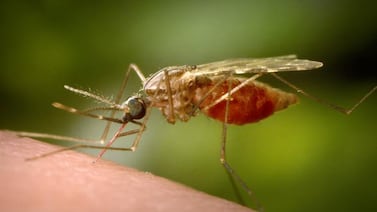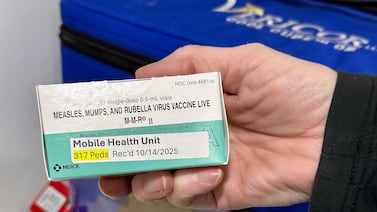Public health, explained: Sign up to receive Healthbeat’s free Atlanta newsletter here.
As Atlanta and Georgia enter the end of the traditional winter respiratory illness season, there are still signs that airborne viruses are circulating widely.
Data from the Centers for Disease Control and Prevention related to flu, Covid-19, and respiratory syncytial virus indicate a wide range of trends. The number of flu hospitalizations, which have made up the vast majority of Georgia in-patient visits among the three diseases this year, continue to decrease from a second winter peak. But Covid hospital stays have risen throughout February to the highest numbers this winter.
Still, there continues to be significantly fewer state hospitalizations for Covid infections than for flu, which has killed 70 Georgia residents since early October. Georgia’s Covid hospitalization rate remains lower than any winter since U.S. cases were first detected in 2020.
These trends are reflected by the CDC’s wastewater data, which can help public health analysts predict future disease patterns. As of late February, Georgia’s Covid levels have elevated significantly compared to January, whereas flu wastewater sites have detected the opposite pattern.
Additionally, levels of RSV in Georgia have slightly ticked up after declining throughout January and February, indicating that hospitals could soon be seeing more patients with the virus. The rise has yet to approach the state’s December numbers, which were among the highest Georgia levels in years.
Georgia doctors have cautioned that while respiratory disease cases typically decline throughout March, there could be another surge in infections at untraditional times. That’s why many recommend that anyone who has yet to receive a Covid or flu shot over the past few months get one.
A different highly infectious virus, measles, appears to be contained in Georgia. Nancy Nydam, a spokesperson for the Georgia Department of Public Health, said there have been no additional cases related to the outbreak that infected three unvaccinated metro Atlanta residents earlier this winter. She added that potentially exposed residents, most of whom were in communication with local and state public health officials, are now out of the period where a new infection may emerge.
Georgia’s outbreak was relatively small compared to others across the United States. In Texas and New Mexico, 155 residents have contracted measles cases this winter. Earlier this week, Texas health officials announced a child had died of the disease — the first U.S. measles death since 2015.
Allen Siegler is a reporter covering public health in Atlanta for Healthbeat. Contact Allen at asiegler@healthbeat.org.







